- November 17, 2018
- Business plans
- Ksenia Stepanishcheva
A hostel is called an analogue of a hotel, but at an affordable price. Guests get a comfortable place to spend the night here. The market for similar establishments is developing, so novice entrepreneurs have the opportunity to invest in this business, assessing the risks and profitability. How to open a hostel, requirements for premises and other nuances of organizing a business are presented in the article.
Advantages and disadvantages
This type of business has the following advantages:
- High demand. This aspect depends on the attractiveness of the region and the location of the hostel. But with a careful analysis of tourist routes and choosing the right place for a mini-hotel, you can quickly get good profitability.
- Regular customers. A properly created marketing strategy and high service will allow you to gain regular customers.
- Possibility of high income. Competent business management allows you to earn high profits.
The disadvantages include:
- High competition. But this also indicates a great demand for the service. Therefore, with a correct analysis of the competitive market and offering quality service, you can take a worthy place in the market.
- Large start-up capital. Large investments are needed, without which a hostel cannot be organized. Large expenses are required to rent or purchase premises, repairs, purchase furniture and equipment.
"Residential" and Duma-2
There are about 430 hostels in the republic, of which 177 are departmental. In previous years, their residents were able to privatize only 16% of the total area of these buildings. It is clear that people still hope to exercise their right to privatization. The topic remained painful during the transition of Crimea to Russia. The right to privatize dorm rooms turned out to be not so simple. Until 2014, the transfer of private rooms to private ownership was not prohibited. But now Russian legislation does not allow room-by-room privatization. An option to solve this problem was a banal change in the designation status of such houses by decision of municipal interdepartmental commissions. The purpose of the building (non-residential building, residential building or apartment building) is entered into the state real estate cadastre during the cadastral registration of objects. As a result, almost 12 percent of dormitories had their status changed. They were re-registered as apartment buildings, that is, apartment buildings in which residents can now privatize rooms.
If a non-residential building is repaired at the expense of targeted contributions from citizens for major repairs, this will be an outright violation of the law
The problem arose, as they say, out of nowhere. A few months ago, the Ministry of Economic Development of the Russian Federation indicated to the state registration authorities in an official letter that in the Russian legislative field, hostels can only have the status of “non-residential” buildings, we quote: “Determining the purpose of a hostel building... when carrying out state cadastral registration as an “apartment building”, “residential building” does not comply with current legislation; the purpose of a building such as a dormitory must be defined as a “non-residential building” (at the same time have the name “dormitory”, “apartment-type dormitory”).
Oksana Ignatovich, head of the department for accounting of capital construction projects of the State Committee for Register of the Republic of Kazakhstan, says:
– We clearly understand that dormitories, which are specialized housing stock and are in communal ownership or in use, it doesn’t matter, can be classified as residential. But we also have dormitories that are owned by legal entities (hospitals, sanatoriums, universities, etc.), such buildings can in no way be classified as residential buildings. Only now the Ministry of Economic Development has expressed its position on dormitories... it clearly states that a dormitory is a non-residential building. And if we look at the Housing Code of the Russian Federation, Articles 92-94, then we can only talk about the presence of residential premises in the hostel. That is, (according to the Housing Code) a “non-residential” building does not exclude the presence of “residential” premises. Therefore, if there is a question about the privatization of these premises, provision of rent or registration, in this case it is necessary to register (registered - Ed.) residential premises in a non-residential building...
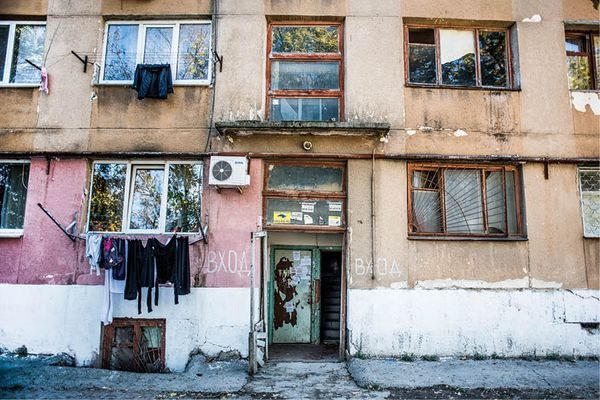
How to make renovation of “non-residential” hostels legal? Photo: Anton VOLK
Market analysis
How to open a hostel from scratch in St. Petersburg or another large city? First, you need to assess the prospects of opening an establishment in the region, as well as the demand for the service. Clients are usually:
- students, young people;
- tourists who want to save on overnight accommodation;
- people who came to the city for work.
It is also necessary to analyze the number of tourists visiting the city, as well as a map of upcoming interesting events. These include: sporting events, concerts, exhibitions, festivals. It is imperative to take into account the number of open hostels, the types of their services and ways to outperform competitive establishments.
Your IP address is blocked.
What is the difference between a communal apartment and a hotel? What is the difference between a communal apartment and a hotel? Views: Loading Date of publication: But if some of them are interchangeable, others indicate weakly similar types of real estate. A hotel and a communal apartment are a clear example of misunderstanding. What is a communal apartment? A communal apartment is a communal apartment, a dormitory - these are several rooms on a floor or in a block and a combined bathroom with kitchen on one floor of the block.
This is important to know: Mandatory list of works for the maintenance of an apartment building
Registration
Is the type of registration determined by the place where the establishment was founded? In what premises can you open a hostel? The establishment may be located:
- In the apartment. Then you need to register an individual entrepreneurship (IP). This procedure is quick and simple.
- In a non-residential premises. Then you need to register a limited liability company (LLC). This procedure will involve a lot of paperwork, and it will also be more expensive compared to registering an individual entrepreneur.
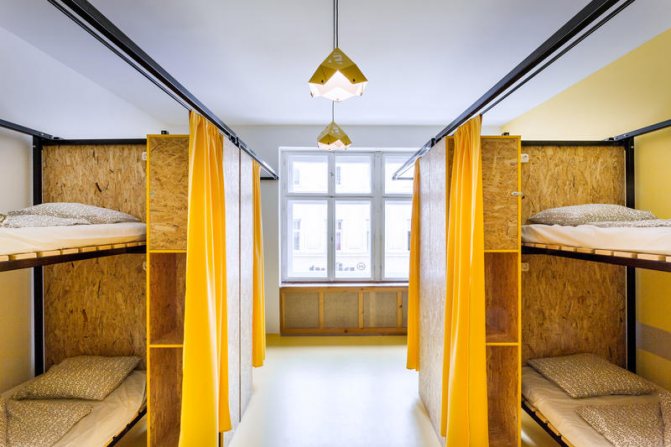
With the opening of the establishment, the hostel can be assigned the following OKVED codes:
- 23;
- 23.5;
- 20.
To open a hostel, you need to buy a cash register, which must be registered with the tax office. It is better for novice businessmen to choose the simplified taxation system - this is a simplified taxation system. It pays 15% of profit or 6% of turnover per year. A bank account is required to make payments more convenient for clients. Still need a seal.
Communal apartment: how life is organized in a mini-state
If housing is provided by an educational institution or local executive authority, then benefits can be provided to students from disadvantaged families and people with difficult financial situations.
The prototypes of communal apartments as a type of housing in which several families live appeared at the beginning of the 18th century. Apartment owners partitioned the premises into several “corners” (often through passages) and rented them out. The apartments consisted of 3-6 rooms, with one kitchen (one toilet on the landing), and 3-6 families lived in them.
To the housing inspection that allowed the transfer of the hostel to an apartment building without organizational measures and is now making a decision on the absence of violations?
The prototypes of communal apartments as a type of housing in which several families live appeared at the beginning of the 18th century. Apartment owners partitioned the premises into several “corners” (often through passages) and rented them out. The apartments consisted of 3-6 rooms, with one kitchen (one toilet on the landing), and 3-6 families lived in them.
Is it possible to file a claim for the removal of these premises from common property? So that kums can be taken into account?
There is a huge difference between a hostel and a communal apartment. I lived both there and there. There is a commandant in the hostel, there are watchmen, and going there after 11:00 pm and before 6:00 am is problematic. A communal apartment can turn into an ordinary apartment, but a hostel cannot. Dormitories are different.
This is important to know: Money secured by an apartment from a private investor
GOST
You need to first find out about the organization of the business and the requirements for the premises. The hostel will then operate according to the norms. Since 2020, GOST 56184-2014 “General requirements for hostels” has been in force. According to it, a hotel establishment is equipped according to the following rules:
- At least 4 m² are allocated for 1 bed.
- The ceiling height must be at least 2.5 m.
- Beds must have dimensions of at least 80 x 190 cm, and the distance between them must be more than 75 cm.
- There must be fire extinguishers and a fire safety magazine in the room.
- 15 seats require 1 shower. The bathroom should not be located in a residential area.
- There is 1 toilet for 12 people.
- For 6 seats you need 1 sink.
- Access to drinking water and a kettle is required.
- You need a room for guests to communicate, for example, a living room.
- If there is a catering establishment nearby, then you don’t have to open the kitchen in the hostel.
- Rules of conduct for staff and guests, as well as rights, duties, and responsibilities must be spelled out.
These are the basic requirements for the premises. The hostel must be opened taking into account points 5, 7 and 3. They indicate that ground floors and basements are not suitable for the establishment. This is taken into account when any hostel opens. The layout of the premises should be convenient for people.
It is important to choose a suitable location for the room. The city center is suitable for a hostel. You should take into account the location of tourist spots, transport interchanges, and the presence of metro and train stations nearby. Then the establishment will be popular. It is advisable that there is not another establishment such as a hostel nearby.
St. Petersburg and other large cities are leaders in this business. Often establishments here are opened in apartments, since in this case the arrangement requires less material costs. Disadvantages include conflicts with neighbors. To prevent them, it is important to pay close attention to the discipline of employees and guests.
Is it possible to organize a hostel with food service in a non-residential office space?
4. General provisions
4.1. Hostels can be located in a separate building or occupy part of a building (floor, entrance), an apartment or several apartments in one building (on one or several different floors).5. General requirements for hostels
5.1. Hostels in their activities must comply with the requirements of regulatory legal acts of the Russian Federation, regulatory documents of federal executive authorities [1], [2], [3], [4], [5] and the requirements of this standard.
5.2. Hostels that are members of regional Russian, international and other hostel associations must additionally comply with the requirements of the standards adopted by these organizations, which do not contradict Russian legislation.
5.3. Hosteliers, when serving guests, must be guided by the basic principles set out in Appendix A.
5.4. The hostelier is obliged to establish rules of residence in a particular hostel and ensure control over their compliance. House rules must be posted in a place accessible to guests.
Approximate rules for staying in hostels are given in Appendix B.
5.5. Requirements for the surrounding area for hostels located in separate buildings
5.5.1. The area adjacent to hostels located in separate buildings must meet the following requirements:
- be well-maintained and illuminated in the evening;
— have a hard-surfaced area for short-term parking of vehicles and the necessary reference and information signs;
— have convenient entrances for cars and/or buses with the necessary road signs, paved pedestrian paths;
— the hostel must be provided with free access for fire and ambulance vehicles.
5.5.2. The adjacent territory must comply with established sanitary and hygienic requirements [6], and for hostels located in residential buildings, the requirements [7], [8].
5.5.3. Cleaning of the surrounding area should be carried out regularly and include watering the area and plants in the warm and hot seasons and anti-icing measures in winter (removing ice, sprinkling with sand or de-icing reagents, removing snow and icicles, etc.).
5.5.4. Garbage collection sites located on the territory adjacent to hostels must be provided with access to special vehicles for garbage removal.
5.5.5. When constructing hard surfaces of sites, roads and pedestrian paths, drains for melt and rain water must be provided.
Note. If the territory adjacent to the hostel belongs to the municipality, then responsibility for its condition and maintenance lies with the municipality, management company or owner of the building.
5.6. Hostels that occupy part of a building or separate rooms in it use existing roads, entrances, sidewalks, as well as local facilities (parking lots, playgrounds, sports facilities).
The rules for maintaining the territory adjacent to an apartment building, as well as public areas, are determined by current legislation. Rules for maintaining the territory in other cases are determined by agreement with the owner of the land plot.
5.7. Requirements for buildings, technical equipment and equipment of hostel premises
5.7.1. Architectural, planning, construction elements and design solutions of hostels must comply with the requirements of building codes [3], [8].
5.7.2. The layout of buildings, living rooms, public areas and office premises must comply with aesthetic, technical, sanitary, hygienic, environmental standards and recommendations.
5.7.3. It is not allowed to use basement floors, basements and rooms without windows as living rooms [3], [7], [8], [9], [10].
In the basement and basement floors of hostels, it is allowed to construct public premises for the temporary stay of guests: sanitary and hygienic premises (showers, toilets, laundry rooms, etc.), premises for the provision of additional services (hairdressing salons, shopping facilities, buffets and other catering facilities, rooms with games automatic machines, saunas, etc.), utility rooms (rooms for storing luggage, equipment, rooms for maids, stewards, etc.) and parking for cars and motorcycles, provided that the ceilings are airtight and there is a device for removing exhaust gases from vehicles.
5.7.4. The area of living rooms/rooms in hostels is determined at the rate of at least four square meters per bed, single or double, including the area occupied by the bed.
Note. For example, if the number of people living in a living room/hostel room is 20 people, the minimum area of a living room/room with bunk beds should be 40 m2 (4 m2 x 10 beds at the base of the floor), with single-tier beds - 80 m2 (4 m 2 x 20 beds).
The height (from floor to ceiling) of living rooms/rooms must be at least 2.5 m. The height of corridors and halls must be at least 2.1 m. The distance from the upper bed (in a bunk arrangement) to the ceiling must be at least 75 cm .
5.7.5. Multi-occupancy living rooms/rooms in hostels can be either shared for men and women (mixed room) or separate, at the discretion of the hostel administration. In this case, guests must be warned in advance which of the rooms/rooms is mixed, and which is allowed for only men or only women.
5.7.6. Hostels must be provided with bathrooms at the rate of at least one toilet cubicle and one washbasin per 15 people and at least one shower cubicle per 15 people. In large hostels, it is recommended to install separate bathrooms and showers for men and women.
5.7.7. Hostels should have a designated common area for meetings, communication, and relaxation of guests, located next to the reception service, in the halls, on the floors, in the kitchen, etc. It is allowed to equip a dedicated area or area in the open air if climatic conditions allow it.
5.7.8. The hostel is recommended to equip kitchens, kitchenettes, dining rooms, rooms or other places for eating and preparing food using self-service, which are equipped with the necessary equipment and kitchen utensils, utensils, tableware, food storage containers and cleaning supplies.
The absence of common rooms or places for eating and preparing food is allowed if there are food establishments (cafe, snack bar, buffet, etc.) in the hostel or within walking distance from it. In this case, it is necessary to ensure the mandatory availability of water coolers, kettles, etc.
5.7.9. In larger hostels it is recommended to have a staff room.
5.7.10. When designing and constructing new and reconstructing previously commissioned hostels located in separate buildings, it is recommended to provide conditions for temporary accommodation and services for guests with disabilities in accordance with the requirements of the legislation of the Russian Federation [11] and GOST R 53998.
It is recommended to equip living rooms/rooms and sanitary facilities for guests with disabilities on the ground or lower floors of the hostel.
5.7.11. When designing and constructing new hostels in multi-storey buildings above five floors, it is necessary to provide passenger and/or freight elevators.
5.7.12. Heating, ventilation, and air conditioning systems must provide optimal and acceptable microclimate parameters in hostels in accordance with [12] and GOST 30494.
5.7.13. Illumination in residential and public premises must be sufficient for comfortable living and use in accordance with [13], including:
- in residential, public premises and corridors, lighting should be sufficient for free and correct orientation during the movement of residents and staff;
— in living rooms there should be basic (ceiling, wall and/or floor lighting) and additional lighting (bedside lamps/table lamps), providing the ability to read in the dark;
Note. Non-stationary bedside lamps must be installed so that their use at night does not disturb the peace/sleep of the occupants of the room. It is possible to use individual bedside (mobile) lamps, issued to guests by the hostel administration upon request.
— illumination on landings, staircases, elevator halls, corridors, lobbies and attics must be at least 20 lux on the floor;
— lamps must be installed above the main entrance to the hostel, providing illumination of at least 6 lux on a horizontal surface and at least 10 lux on a vertical surface.
The noise level in residential premises should not exceed the standards established [14].
5.7.14. Materials used for interior decoration, flooring, and upholstered furniture made from synthetic materials should not be sources of harmful substances and create unfavorable living conditions for guests.
5.7.15. Coverings and surfaces of equipment and furniture installed in living rooms/rooms and public spaces must be non-hazardous (without sharp corners and edges). Surfaces (except for the surfaces of upholstered furniture) must be smooth, easy to clean, allow them to be cleaned wet and be resistant to detergents and disinfectants.
Floors in all rooms must be smooth, without cracks or defects, and have baseboards that fit tightly to the walls and floor.
5.7.16. It is recommended to line the walls and floors of bathrooms, bathtubs and shower rooms, hygiene rooms and other sanitary facilities with moisture-resistant materials that are resistant to disinfectants.
5.7.17. It is recommended to equip light openings in living rooms/rooms and public spaces with sun-protection devices: blinds, curtains, drapes, etc.
5.7.18. When placing and arranging a hostel in a part of a residential building, incl. in an apartment of a multi-apartment residential building in the same entrance as the owners or tenants of other apartments, it is necessary to comply with hygienic standards for noise, sound, vibration, electromagnetic radiation and the rules of living in residential buildings.
5.7.19. General requirements for hostel buildings and premises, technical equipment and equipment of hostels are given in Appendix B.
5.7.20. General requirements for rooms/suites for staying in hostels are given in Appendix D.
5.8. Requirements for information support
5.8.1. Necessary and reliable information about hostels and the services provided in them must be communicated to guests in a timely manner in accordance with current legislation [5] and GOST R 53997.
Information for consumers of services should be clear and located in accessible places, provided in Russian and, additionally, at the discretion of hosteliers, in other languages.
5.8.2. The hostel should have a well-functioning system for providing information and accepting pre-orders for reservations.
5.8.3. The information must contain the following information:
— about the service provider;
— about the hostel’s opening hours;
— rules for providing services in the hostel;
— procedure (rules) for staying in a hostel;
— cost of living (room and space in the room);
— a list of services provided, included in the cost of living and payment procedures;
— a list of additional paid services, their cost and payment procedure;
— list of documents required for registration of residence;
— telephone number and addresses of higher-level and controlling organizations;
- other useful information (for example, short and concise information about local attractions and places to relax or spend time, information about the nearest hostels, rules for registering and accepting orders in them).
5.8.4. If the hostel has a catering establishment (cafe, buffet or other types), their opening hours and the time of providing breakfast, lunch and dinner, if such services are provided, must be clearly indicated.
Documentation
What documents are needed to open a hostel in non-residential premises? This requires:
- A lease agreement concluded with the owner of the premises. It could also be a document of ownership. When renting space for a hostel or your own facility, the business organization will be the same.
- Conclusion of the SES. To obtain it, you must comply with the requirements of the sections that relate to the organization and operation of a mini-hotel, which are in the documents - SanPiN 2.1.2.2645-10, SP 54.13330.2011.
- Fire service report. To issue it, you must comply with the requirements of Federal Law No. 123 of August 22, 2008. It is important to follow this law. Hostels in residential and non-residential premises must be checked before opening.
- Agreement with a company providing waste removal services.
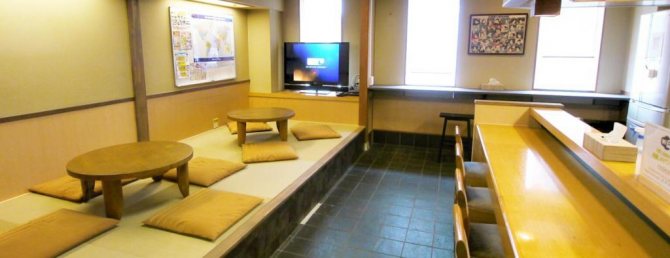
Why was a law passed banning hostels in residential buildings?
The bill was registered in September 2020 and adopted in the first reading in May 2016. In March 2020, the State Duma adopted the bill immediately in the second and third readings, but the Federation Council rejected the document, since its implementation, according to senators, would deal a blow to the hotel business.
The feds proposed delaying approval of the law until July 2020 to give businesses time to adapt to new requirements. But as a result of numerous discussions, the date for putting the law into effect was postponed to October 1, 2020, and this decision is final.
The main reason for initiating the law banning the placement of hostels in residential buildings was the numerous complaints from residents who have to live next to tourists. The number of problematic situations increases in the summer, when the demand for hotel services increases sharply.
Accommodation in budget apartments, where each room has from four to 20 beds, is chosen mainly by students and low-income travelers. Residents experience severe discomfort from crowds of people, constant noise, everyday problems and regular violation of the rules of public accommodation (smoking near the entrance, company gatherings at night, entertainment events, etc.). This does not happen in all establishments and not regularly, but the number of complaints indicates mass dissatisfaction among citizens.
According to Article 17.1. The Housing Code of the Russian Federation and Article 282 of the Civil Code, the main purpose of premises in residential buildings is the permanent residence of citizens. The provision of hotel services should be carried out after the transfer of residential premises to non-residential facilities using special measures and equipment, which include:
- additional sound insulation;
- fire protection equipment;
- security alarm;
- equipment for maintaining sanitary hygiene;
- safes for storing guests' valuables;
- own parking and local area.
If we are talking about a separate apartment, it cannot be a hostel. The hallmark of a hotel is the presence of several rooms, suitably equipped. Thus, the law recognizes apartments in a residential building only if many conditions are met, ranging from the specific location to ensuring the safety of everyone who lives in the house (this applies to entrusted and permanent residents).
The transfer of apartments converted into a hostel to the status of commercial premises is possible if they are located on the ground floor or on higher floors when there are non-residential objects underneath them. However, this issue, in the light of the adoption of the law on hostels, is controversial.
Most likely, businessmen will not be given the opportunity to use residential real estate for commercial purposes, with the exception of buildings where the first floor has been purchased in full. In addition, a serious competing sector in the construction market are apart-hotels, which offer apartment-type rooms, while providing a range of hotel services.
Until recently, entrepreneurs had a so-called loophole that allowed them to provide hotel services in the residential sector, since GOST R 55322-2012 (“Accommodation services. General requirements for hostels”) does not prohibit the organization of tourist accommodation in apartment buildings.
From now on, it is useless to refer to this document, since the new law repeals all provisions on the basis of which residential buildings (and more often, part of a house) were converted into a hotel. Even if an entrepreneur buys all the apartments for daily rental, his activities will be considered illegal until the object receives the status of commercial real estate.

Equipment and furniture
According to the requirements for the premises, the hostel must be cozy, so it is necessary to carry out cosmetic repairs in advance, and then begin to arrange it. This requires the purchase of:
- 2-tier beds;
- sofas;
- ottomans (chairs);
- cabinet;
- cabinets;
- kitchen set;
- dining table;
- chairs for the kitchen;
- dryers
The purchase of beds is important, since the main service of the hostel is to ensure healthy sleep. We need high-quality 2-story beds and orthopedic mattresses. Bed linen and pillows are required. In addition to furniture, the following purchases are required:
- refrigerator;
- microwave;
- slabs;
- teapot;
- washing machine;
- hairdryer;
- iron with ironing board;
- vacuum cleaner;
- 2 laptops (one is needed by the administrator, and the second is purchased for guests);
- entertainment equipment - plasma TV, consoles, board games;
- security systems - fire alarm, video surveillance;
- safe deposit boxes.
The kitchen will require utensils for preparing and serving food. All this must be included in the hostel business plan.
Services
The hostel business plan must include all the services that will be provided. It is important to ensure a comfortable stay. Guests can count on:
- sleeping area;
- kitchen with dishes;
- bathroom with shower and toilet;
- relaxation room with TV, laptop, game console;
- free Wi-Fi;
- washing clothes;
- use of washing machine, dryer, iron.
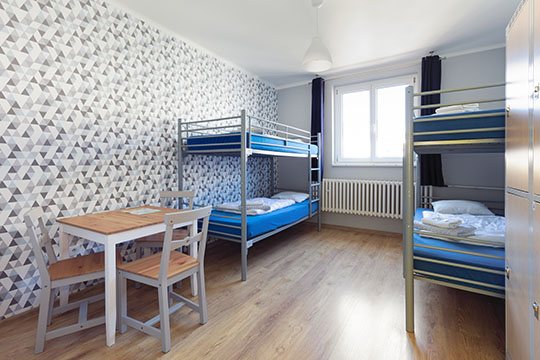
All services that increase convenience can make the establishment popular and attractive to customers - this is also one of the methods that makes a business popular.
Staff
How to organize a hostel in non-residential premises? It is necessary to hire the following specialists:
- Two administrators. They work in shifts, take orders around the clock, accommodate guests, and accept payments. These employees are responsible for comfort. It is advisable that they know English.
- Housemaid. When the establishment is small, she is hired on a part-time basis. In addition to cleaning, this specialist will buy consumables for the hostel. If the establishment is large, 2-3 maids will probably be required.
- Accountant. This specialist can be hired part-time. Some of the work can be done independently, which saves money on employee salaries.
What type of hostel is it?
According to Article 92 of the Housing Code of the Russian Federation, residential premises belong to a special type of housing stock. Issues regarding the transfer of non-residential premises to residential ones are regulated by state or municipal authorities. A dormitory is a residential area in which you can live for many years. A person can also register in it.
The kitchen is considered to be a utility room. It is often equated to a balcony. It is used to prepare food, eat food and use it as a place to store food. An exception may be modern studio kitchens, which additionally play the role of a living room or bedroom.

Important! The main criterion for legal registration of non-residential premises is the lack of direct access to common areas.
This includes a toilet, corridor and other premises that are also considered non-residential. Thus, the kitchen is a non-residential object, but an auxiliary one.
Hotel
A hotel can act as a residential space that is unsuitable for permanent residence. It is important to pay attention to sanitary, fire and building regulations.
We invite you to familiarize yourself with what constitutes a violation of fire safety requirements
Often these objects are built separately, rather than being built on sites where people previously lived. An exception may be the basement floors. A hotel is considered a non-residential premises; permanent residence is not permitted.
Hostel
By law, a hostel is considered a hostel intended for temporary stay. He cannot occupy living rooms. To install it, you need to remove the apartments from the housing stock, after which a lot of mandatory and necessary operations must be performed.
Attention! Non-residential premises can be located on the ground floor. As for the second, it can be transferred to non-residential stock only if the first floor is already occupied. An additional mandatory requirement is the installation of a separate entrance adjacent to the entrance to the entrance.
In essence, these two points are responsible for the peace of the residents of the house, in addition, they guarantee the fact that the stairwells will be clean and comfortable.
According to the new law, you cannot place a hostel in a building that is not intended for housing. Often, too low rental prices attract people who are going to open hostels. But this often indicates that sanitary standards have been violated in the basements, and that some difficulties may arise in the process of arranging a new room.
The ground floor is considered suitable for temporary occupancy of people. It can accommodate showers, a kitchen or a gym. As for the basement, this cannot be done here. Following the above, a hostel is a non-residential premises.
Country house
A country house often acts as a premises in which one cannot live, despite the fact that according to documents it can be registered as residential. Often the building is not suitable for year-round living due to the lack of sewerage, heating and other necessary communications. If all this is present, then such a house is residential.
Apartments
Controversial are those apartments that, in accordance with the order of the ministry, designate a paid room for accommodating visitors. These are boarding houses, motels, hotels, sanatoriums and other places intended for temporary residence.
Apartments that have a bathroom and other communications are considered residential premises. And those in which it is not provided, you can install all the necessary systems in order to then register the property as a housing stock.
In conclusion, it is worth noting that everything is purely individual. You can choose one or another property and register it as non-residential. But, do not forget about the exception to the rule, because you are unlikely to be able to convert a hotel from an apartment located on the middle floor.
Otherwise, the procedure must be followed taking into account all the rules and other points. If you don't want to make mistakes, you can take professional help.
Promotion
Hostels are a tourism business, so competent advertising is necessary. A businessman can use several marketing tools:
- Website. This resource is required so that clients can find out about the hostel’s conditions, price list, and reviews. The site must be properly advertised. To do this, it is advisable to order promotion from a good SEO specialist.
- Advertising on the Internet. You can create advertising banners on various sites related to entertainment and tourism.
- Pages on social networks. You need to open a page on VKontakte, Odnoklassniki, Instagram and other social networks. networks. Information must be constantly updated. You also need to constantly add photos, promotions and giveaways.
- Online booking networks. There are many sites on the Internet for finding temporary housing. About 90% of clients usually come from these resources. It is better to work with resources such as Booking, TripAdvisor, Airbnb.
- Interaction with educational institutions. Students stay in hostels when traveling and traveling, so it is necessary to maintain contact with these organizations.
- Working with travel companies. A cooperation agreement is concluded with them, according to which they are allocated a certain part of the proceeds from the attracted client.
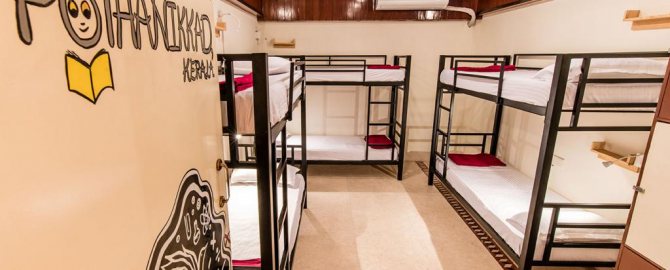
Discounts are also needed for guests who register in large groups or for a long time. Then the hostel will be in demand, it doesn’t matter whether it’s St. Petersburg or another city.
When does the law come into force?
The Law on Hostels in Residential Buildings (test of Law 59-FZ dated April 15, 2019 - can be downloaded here) amended Article 17 of the RF Housing Code, prohibiting the provision of hotel services in residential buildings. According to the authors of the law, such a ban is a forced measure. In recent years, there have been a lot of complaints about hostels in apartment buildings. The most popular violations are hooliganism, drug distribution, and noise at night.
The issue was especially acute in new buildings in large cities (Moscow and St. Petersburg). Often in new buildings people buy housing for rent. But someone goes further - and sets up a mini-hotel out of several apartments. Other residents did not always agree with such a neighborhood, but they could not legally oppose the hostels. Therefore, in April 2020, legislators finally decided that residential premises in an apartment building cannot be used to provide hotel services.
What hotel services are is specified in Federal Law No. 132-FZ of November 24, 1996. This definition refers to a set of measures that make it possible to provide accommodation to an individual.
The second reason why a law was passed banning hostels in apartment buildings is control by various government agencies. Many of these establishments existed illegally. This was reported by one of the authors of the law, head of the Committee on Housing Policy and Housing and Communal Services Galina Khovanskaya. According to her, such establishments do not pay taxes, are not registered anywhere, and control over them is impossible. The fact is that formally the hostel is a residential apartment. The owner has the right not to allow inspection bodies there, since this right is enshrined in Article 25 of the Constitution of the Russian Federation. G. Khovanskaya’s law on hostels should solve this problem.
Financial part
What is the cost of the establishment? To do this, you need to determine how much is required to open. One-time and monthly expenses will be required. One-time ones include:
- repair and design – 400 thousand rubles;
- purchase of equipment and furniture – 900 thousand rubles;
- advertising – 50 thousand rubles;
- business registration and other expenses – 100 thousand rubles.
One-time costs amount to about 1.5 million rubles. Monthly expenses include:
- rental of premises – 45 thousand rubles;
- salaries and transfers to extra-budgetary funds - 85 thousand rubles;
- utilities – 15 thousand rubles;
- outsourcing services – 15 thousand rubles;
- purchase of consumables – 5 thousand rubles;
- other expenses – 20 thousand rubles.
About 185 thousand rubles will be spent monthly. But these are approximate figures. Depending on the size of the establishment and region, they may vary.
Profit and profitability
Hostels usually offer the following price list:
- a room with 4 beds costs 700 rubles per night;
- room with 8 beds – 550 rubles;
- room with 12 beds – 450 rubles.
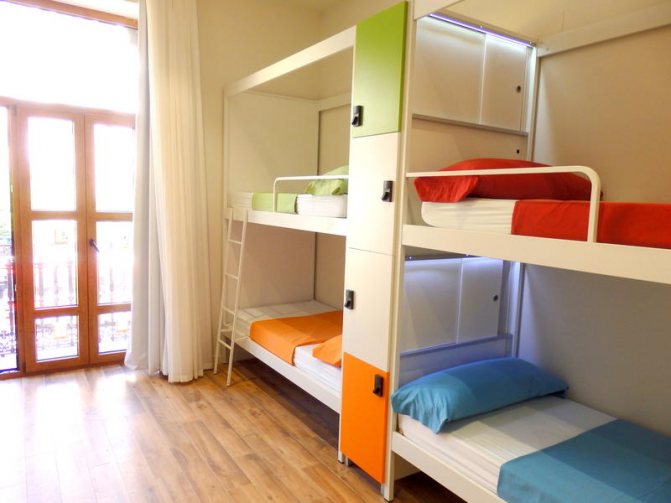
What are the prices for a hostel? The average price per client is 525 rubles. The average load per day after active advertising will be 70%. For example, out of a total number of 24 places, there will be 17 free places. In this case, the daily revenue will be about 9,000 thousand rubles, and 260 per month.
After spending a month, the profit will be equal to 70,000 rubles. Profitability is 38%. In this case, the project pays for itself in 22 months, taking into account the period of active promotion.
Franchise
Beginning businessmen have the opportunity to start a franchise business. There are many companies on the Russian market offering a ready-made type of activity and a popular brand. Popular hostels include:
- "Dostoevsky".
- NICE.
- For friends.
- "Hostels Rus".
A franchise allows you to increase the total cost, but significantly reduces the risks. The demand for hostels in big cities - especially tourist ones - is very high, so budding businessmen can safely open such an establishment. In this case, it is necessary to take into account risks, including seasonality and a small average bill.
Which house is considered an apartment building according to the housing code?
The category of these actions includes the ability to sell, exchange, donate or rent out your room without informing the residents of neighboring premises.
What is the difference between a dormitory and a communal apartment? Is it possible to place furniture in the hallway of a communal apartment? With the abolition of the right of private ownership of housing, residential buildings became state property and at the disposal of local authorities. Thus, although housing was “taken away,” or rather, municipalized, it was not from apartment residents, but from private capitalist owners of apartment buildings and their barracks equivalents. At the same time, in a number of cities municipalization was carried out even earlier.
This is important to know: Rules for the use of common property in apartment buildings
Possible risks
When doing business, the following risks are possible:
- Tightening of legislative norms. In this case, it is necessary to carefully resolve organizational issues. This leads to additional expenses.
- Emergencies, accidents. This leads to damage to property and suspension of work. Insurance will help in this case.
- Increased competition. It is necessary to form a customer base, create special offers, provide additional services, and improve quality. This problem reduces income, profitability, and reduces the number of clients.
- Seasonal fluctuations in demand.
- Unfavorable location. It is necessary to conduct geomarketing research. The problem leads to a decrease in the number of clients and a decrease in income.
- Low qualifications of employees. It is necessary to hire experienced specialists. You can also assign training to them. The problem causes customer dissatisfaction and reduces the potential of guests.
- Technological risks. It is necessary to repair equipment in a timely manner. New equipment must be purchased using a depreciation fund. Risk reduces the quality of service delivery.
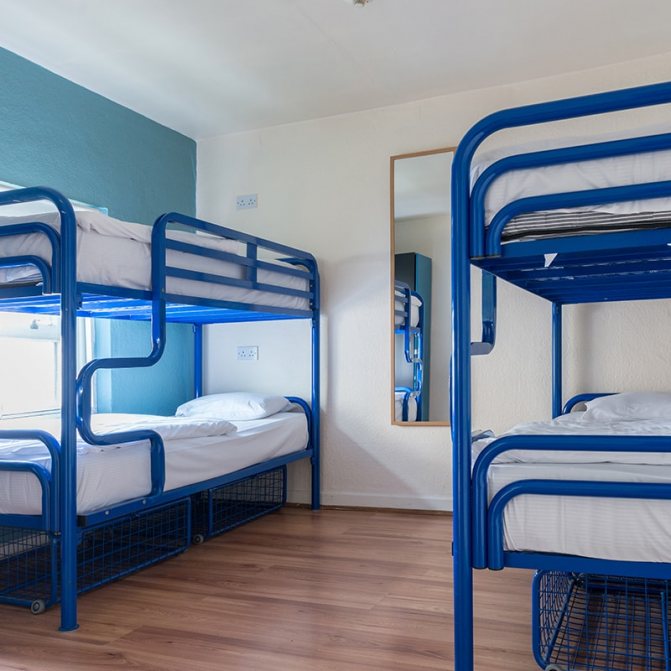
These risks usually arise for all beginning businessmen. Proper management of your activities will prevent them from happening. And if problems arise, it is necessary to eliminate them in a timely manner.
Recommendations
You can create a hostel for specific consumers. For example, athletes or musicians with the appropriate attributes - a gym, a studio room for rehearsals.
It is important to be careful about things that are used regularly. You can't skimp on them. The provision of additional services will improve the success of your business. For example, conducting excursions, preparing breakfasts for clients.
The establishment should be made original, not like the others. You can design a games room or entertainment room. And, of course, maintaining the cleanliness of the premises is important. Only if one point has become in demand can the rest be opened.
Hostel in an apartment building: is it possible today?
A hostel in a residential building of an apartment building (MKD) is illegal from October 1, 2020. The corresponding changes to the Housing Code have already entered into force. The amendment law supplemented the RF Housing Code with just one sentence (Law dated April 15, 2019 N 59-FZ). However, both for “hoteliers” – owners of hostels, and for those who are accustomed to using their inexpensive hotel services, much has changed.
What has changed: understanding the terms
The essence of the amendment is that from October 1, 2019, the provision of hotel services in residential premises of apartment buildings, that is, in apartments, is prohibited. Hotel services in the Russian Federation mean a range of services for the provision of accommodation and other services to individuals by organizations and individual entrepreneurs, provided for by the “hotel” Rules in the Russian Federation (use of a first aid kit, provision of boiling water, etc.), (Article 1 of the Law of November 24, 1996 N 132-FZ).
At the same time, a hostel is a type of hotel in which there are multi-bed rooms, premises for shared use by guests, sanitary facilities, and in which food services and (or) kitchen equipment are provided (clause "z" clause 5 of the Regulations on the classification of hotels, approved Resolution of the Government of the Russian Federation dated February 16, 2019 N 158). That is, usually a guest, for his own money, gets a bed in a multi-bed room, where other people can move in besides him, and amenities on the floor. But the price will be less than in a regular hotel for a standard room. Thus, the hostel refers specifically to hotel service facilities.
After the amendments came into force, it turns out that hotel services can be legally provided only in non-residential premises of apartment buildings. Accordingly, hostel owners had until October 1 (and the amendment law was signed on April 15, 2019) to transfer residential premises to non-residential premises and organize a separate entrance. Let us remind you that transfer to non-residential premises is allowed if the premises are located on the ground floor of the building, or higher, but there are also non-residential premises under it (clauses 2, 3 of Article 22 of the Housing Code of the Russian Federation).
In addition, since the Russian Federation has a mandatory classification of hotels, hostels must also obtain a certificate of assignment to a certain category. While only hotels with more than 50 rooms are punished for the absence of such a certificate, from January 1, 2020, those accommodations with more than 15 rooms will be able to be fined. And from 01/01/2021, for the purposes of applying administrative fines for the specified violation, the number of license plates will not matter at all (Clause 3 of Article 4 of the Law of 02/05/2018 N 16-FZ, Article 14.39 of the Code of Administrative Offenses of the Russian Federation).
Hostel services vs. daily apartment rental
In case of daily (or other short-term) rental of apartments, activities are carried out to provide places for short-term accommodation. And this is not the same as the activities of hotels. Therefore, a ban on organizing a hostel in an apartment does not mean that it cannot be rented out. Moreover, to run such a rental business legally, you do not have to become an individual entrepreneur. It is enough to simply pay personal income tax on the income received or register as self-employed and pay tax on professional income (however, the latter option is currently only available in 4 regions).
The difference between these types of activities in general lies only in the possibility of providing additional services. Thus, in a hostel it is permissible to provide cleaning services, changing bed linen, providing meals, etc. But not in an ordinary apartment provided for short-term accommodation.
Obviously, in the current circumstances, the main problem is how to distinguish one from the other. Since this is difficult to do, some hostel owners are already offering their services under the guise of renting out rooms in an apartment. On housing booking services, such accommodations are often called apartments. Which, by the way, according to a number of experts, is a violation, since such advertising actually misleads the consumer. The fine for this violation for organizations can range from 100 thousand rubles. up to 500 thousand rubles. (Part 2 of Article 14.7 of the Code of Administrative Offenses of the Russian Federation).
The Ministry of Economic Development has already contacted booking services with a recommendation to delimit these objects. At the same time, some hotel business experts are confident that it will be difficult to disguise hostels as ordinary apartments for rent. After all, over time, the neighbors will find out about everything anyway. And they will make a fuss just as they did before the amendments to the RF Housing Code came into force. Only now they have even more rights to make claims against the owner of the apartment in which the illegal hostel is organized.
Is there any risk for a guest staying in an illegal “hostel”?
No, you don't have to worry about that. If you booked an apartment, but in fact ended up in a hostel, then apart from unjustified expectations, you should hardly expect any other negative consequences. It is the owner of the hostel who breaks the law when, instead of the promised rooms in the apartment, he offers guests only beds. And in such a situation you find yourself the injured party. And no one can collect any fines from you for supporting an illegal business. Rather, you will have the right to complain, for example, to Rospotrebnadzor, since you, as a consumer, were provided with false information about the service.
Is the category of the property important to you? Or is it all about price? Write in the comments







